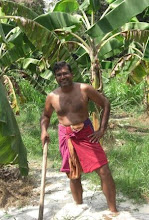At the best of time paddy farming is a very precarious enterprise, but when we were initially told that the water would be given to get our fields ready on October 20th we were hopeful at being able to plant early. However today the 10th of November and we still have no idea of when the water would be given. There have been rains in the past 10 days and the Minneriya tank is pretty full with excess water being sent on one channel via Rotawewa to Kantale Tank and the other channel to the Kaudulla Tank, both for irrigation purposes.
When a farmer is faced with uncertainty like this it is difficult for him to schedule his time effectively, and those that make decisions in Sri Lanka who are usually not the people who are affected by them, do not realize the importance of those decisions for those dependant on them for their livelihoods.
I have decided this season to try and optimize output in both properties I farm in, and to that extent am using what I have experienced to be the two varieties that have done best on the land based on my six harvests to date. It will be sudu kekulu on my fields sown the traditional way and pokuru samba on my sister’s fields being transplanted after preparing a nursery ahead of the water being given, as it is a 4 month variety in comparison to the former that is a 100day one.
This time I just need the yield to be able to sell the produce immediately on harvest as I have a desperate need to encash the harvest for funding needs as opposed to keeping it stored to be sold over time after making it into rice. To that extent I will be reduced this season to that of the same plight as all my neighbors who live from harvest to harvest.
It is interesting to tell the reader that we expect this to be the last season where we receive heavily subsidized fertilizer, and without saying so, the authorities have forced us all to show compost preparation pits of a minimum size prior to receiving the state subsidy. It is a carrot and stick approach as it is deemed that farmers will not otherwise produce compost if they are not compelled to do so. As I have dairy cattle in Meegoda, I took enough steer manure to prepare the compost, but most of my neighboring farmers are scouring the fields to collect cow dung in all the fields cattle have grazed, thereby depriving the fields of the natural composting they have hitherto enjoyed. The problem is as always it was a last minute order, rather than a well planned request which gives the farmer about 6 months to prepare. Our compost pits will not be ready to be spread around the fields this season anyway so I imagine this is to prepare for the inevitable in the next season from May2010.
Subscribe to:
Post Comments (Atom)

1 comment:
found rhis when i was looking for some details about harvesting & threasing of paddy. Actually its for my project.so I want to appreciate ur work.Its very interesting and usefull for people like us.Wonderful photos u presented.I'm also nature lover.
Best regards.
Post a Comment